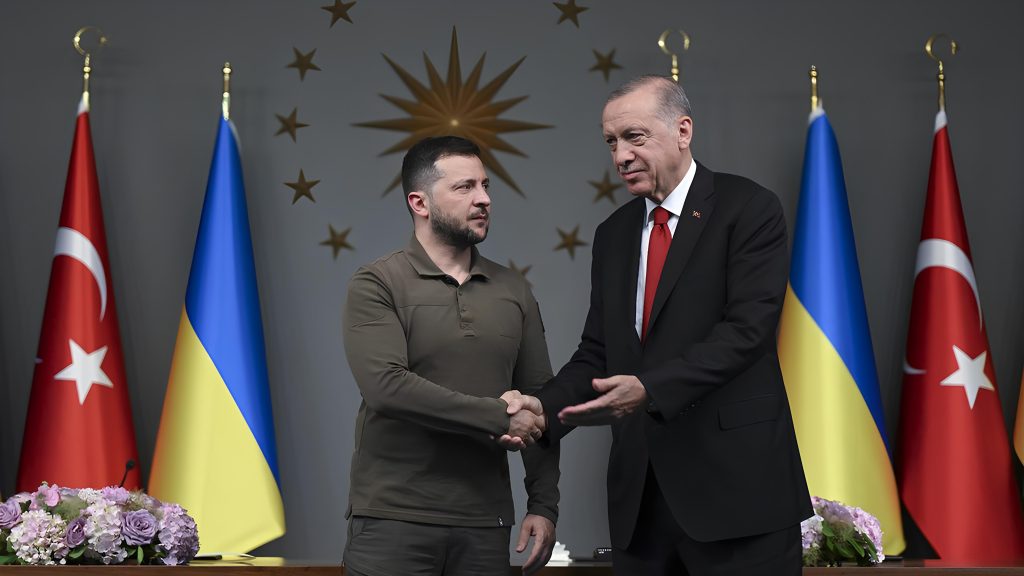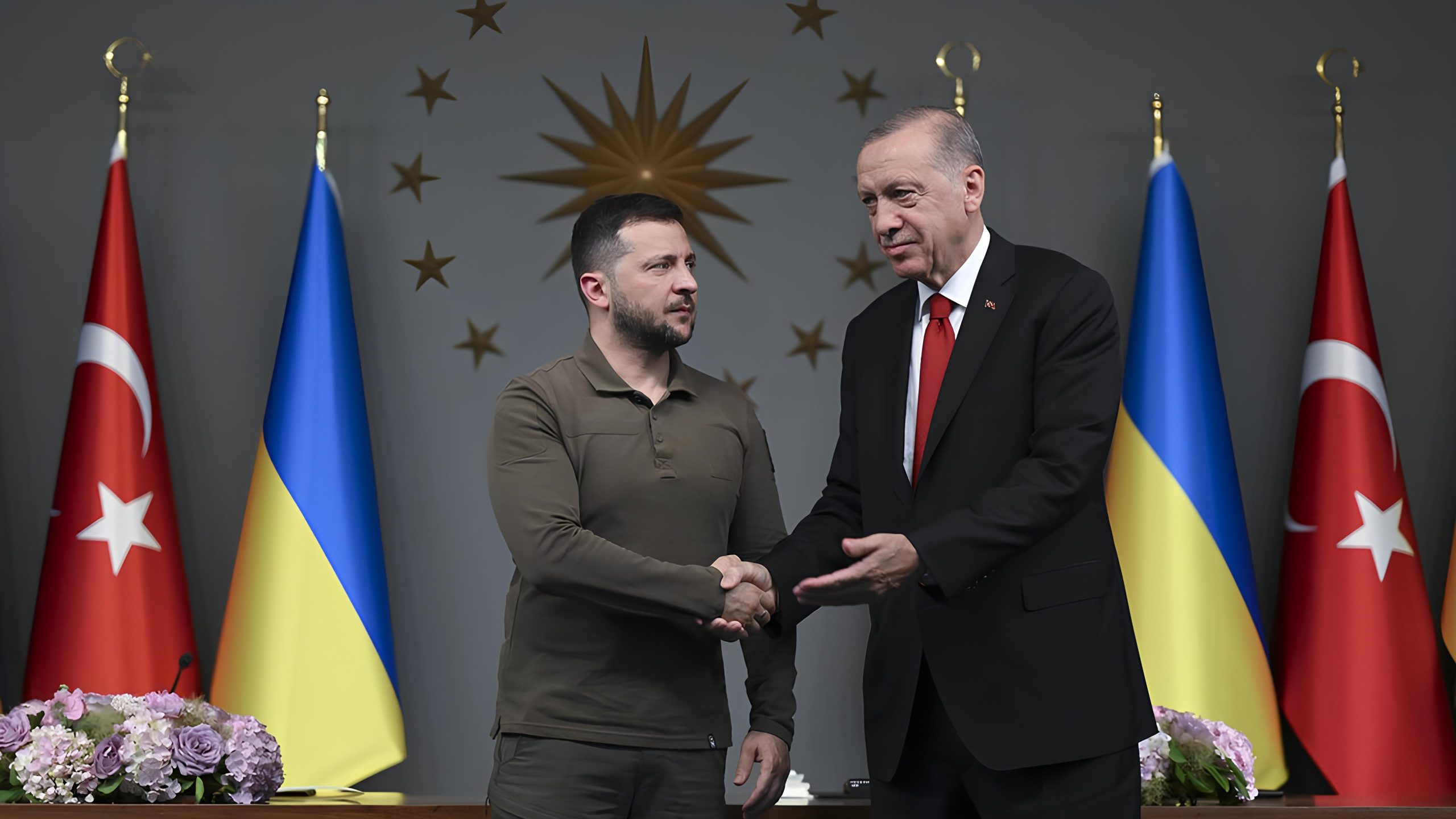
After the Russia-Ukraine War, Turkey stood out with its balance policy and tried to balance its relations with NATO, the EU and the USA.
Written By; Sinem Ünaldılar – Aug 27, 2023
The Russia-Ukraine War changed the entire dynamics of international relations, and the actors of the system redefined their roles and developed new strategies in accordance with the new conditions. The long troubled transatlantic alliance reunited, NATO renewed its strategies, and the EU developed new instruments to make its security and defense policies more effective. With its NATO membership, good relations with Russia, and geopolitical position, Turkey is undoubtedly one of the actors most challenged by the war. Since the beginning of the war, Turkey has endeavored to pursue a policy of balance and reshaped its foreign policy under the conditions required by the difficult conjuncture. Turkey, which prefers a policy of balance in its foreign policy, has played a crucial mediation role in this period.
Turkey brought the parties together at the Antalya Diplomacy Forum, continued its mediation efforts in Istanbul, and negotiated with Russia, enabling the Black Sea Grain Initiative to be signed. It also mediated prisoners exchange agreements. All of these are internationally supported moves that organizations such as the UN have also expressed their satisfaction with. However, implementing a policy of balance has not been easy.Turkey has tried to maintain good relations with Russia while fulfilling its responsibilities as a NATO member.
At the beginning of the war, Turkey characterized Putin’s invasion of Ukraine as war and closed the straits to all warships in accordance with the Montreux Convention (Article 19). Its support for Ukraine and being among the countries that condemned Russia at the United Nations General Assembly are also moves that show its commitment to the Western alliance. However, it did not participate in the sanctions imposed on Russia by the Western bloc and increased its trade volume with Russia. The trade volume of 68.1 billion dollars between 2021-2022 is indicative of the increasing economic volume. It is worth noting that Russia opened 1,363 new companies in Turkey last year. Russia accounts for 19% of Turkey’s tourist arrivals, 8O% of grain imports, and 1/3 of gas imports. Turkey’s military support to Ukraine has been tolerable for the Kremlin as it has not been considered a game changer by Russia. However, the increasingly close relations with Russia also brought criticism from the Western bloc that Turkey was too close to Russia. In addition, the fact that Turkey was not immediately convinced of Finland’s and Sweden’s NATO membership made relations with the Western alliance, which had already been tested by different problems for a long time, more problematic. For Turkey, the approval of Finland’s and Sweden’s NATO membership depended on compliance with the conditions of the Trilateral Memorandum agreed at the 2022 Madrid summit. As per the memorandum, the two countries pledged to cease their support to terrorism and to support Turkey’s involvement in the PESCO Project within the EU. While Finland fulfilled these commitments and became a member of NATO, Turkey initially did not give the green light to Sweden’s membership. Therefore, the most important item on the agenda of the NATO summit held in Vilnius on July 11-12 was Sweden’s membership to the alliance. Since Turkey had not signaled before the summit that it would ratify Sweden’s membership, its approval on the night of July 10 came as a surprise. However, the decision was the result of long-standing discussions and negotiations. Sweden’s NATO membership was not a decision that could be taken independently of the US. Turkey-US relations were also influential on this decision.
Turkey-US relations had been tense for a long time. US support to PYD/YPG, unsold F-16s, CAATSA sanctions on Turkey, and Biden’s less than cordial relations with Turkey have led to a tangle of unresolved issues. Added to these issues, Sweden’s membership was also important in terms of breaking the ice in Turkey-US relations. Therefore, Turkey’s green light created an opportunity and eliminated one of the major obstacles to the sale of F-16s. The removal of the barrier to Sweden’s membership has also made the transatlantic alliance stronger and more united. Turkey’s continued veto would leave it responsible for any future vulnerability. In this respect, the lifting of the veto was appropriate and right.
EU membership is another important issue that comes to the fore when it comes to Turkey’s relations with the Western bloc. Turkey-EU relations have been frozen for a long time. Positive agenda items were considered to revitalize relations, and efforts were made to break the deadlock in relations by making progress in areas such as the revision of the Customs Union, visa liberalization, and energy cooperation. However, the problems in the Eastern Mediterranean, the ongoing political crises with France and Greece, and Turkey’s operations in Syria criticized by EU members prevented progress on positive agenda issues. In this context, Turkey had long stopped putting relations with the EU on its agenda. In this respect, the reiteration of membership by the President at the Vilnius summit is significant. Of course, many challenges stand in the way of Turkey’s EU membership.Unresolved problems with Greece, the Cyprus issue being in the first place, and disagreements with members such as France, particularly in the Eastern Mediterranean, are among the problems with members. Furthermore, the EU’s criticism of Turkey in terms of democracy and human rights, the rise of the far right in the EU, religious and cultural differences, the large population of Turkey, and many other issues that could be added to the list, such as the refugee problem, continue to block the accession process. Therefore, while the country’s EU membership seems unlikely even in the long term, revitalizing the process could at least lead to progress on visa liberalization, a revision of the Customs Union, and cooperation on energy and security issues. Finland and Sweden indicated that they would support Turkey on these issues within the EU.
Turkey’s changing the perception that it is a member standing in the way of enlargement at the Vilnius summit, taking steps to create a moderate climate in relations with the US, andbringing the Iong frozen EU process back to the agenda are very important for the policy of balance. However, it cannot be said that the summit pleased Russia. After the summit, Russia stated that it would not return to the grain deal. It is not easy to carry out a policy of balance in a changing conjuncture, to fulfill one’s responsibilities to the Western alliance while developing economic and commercial ties with Russia. Turkey should continue with this policy, which it has been able to maintain despite the difficulties. It is clear that the country will continue to play a key role in solving problems such as the unresolved Syrian conflict, energy and grain corridor issues, and the security of the Black Sea. A carefully pursued policy of balance points to the path that Turkey should not deviate from in resolving these complex issues.

Sinem Ünaldılar is a faculty member at the Aegean University. She graduated from Ege University, Department of International Relations in 2002. In the same year, she started to work as a Research Assistant at Ege University, Department of International Relations. She completed her master's degree in 2005 with her thesis titled “The Political and Economic Roles of Multinational Companies as International Actors”. She completed her doctorate in EU Studies in 2011 with her doctoral thesis titled “The Effect of Britain's Transatlantic Relations on the European Union Integration Process in the Tony Blair Era”
